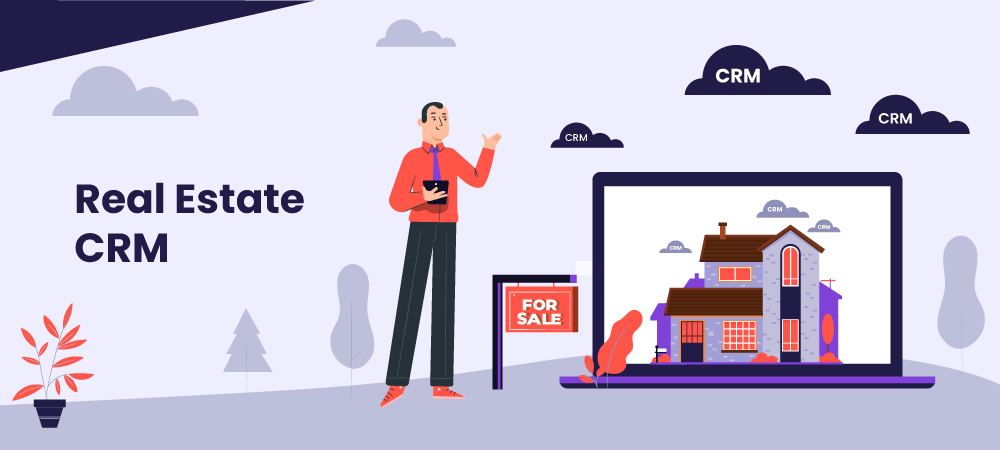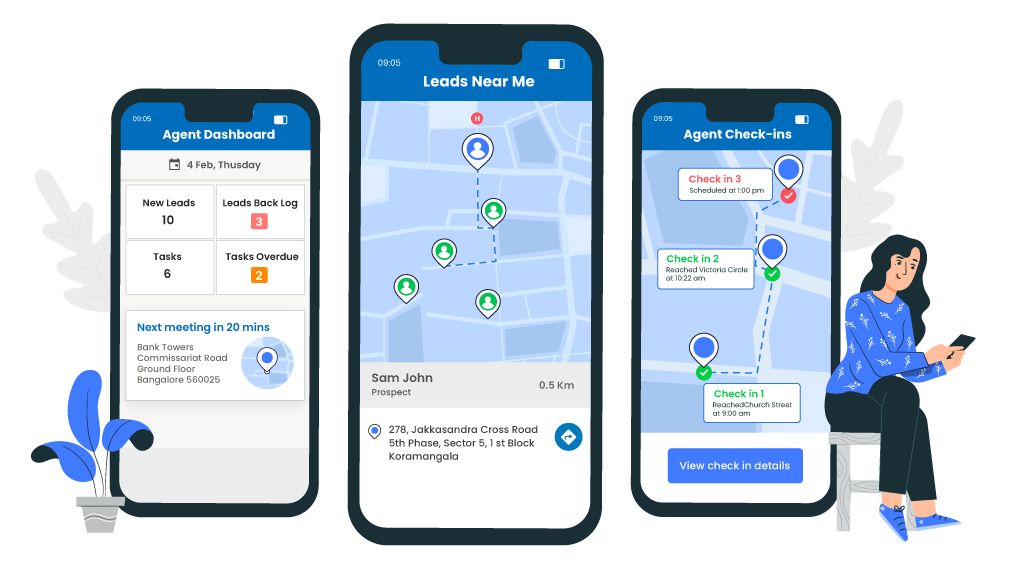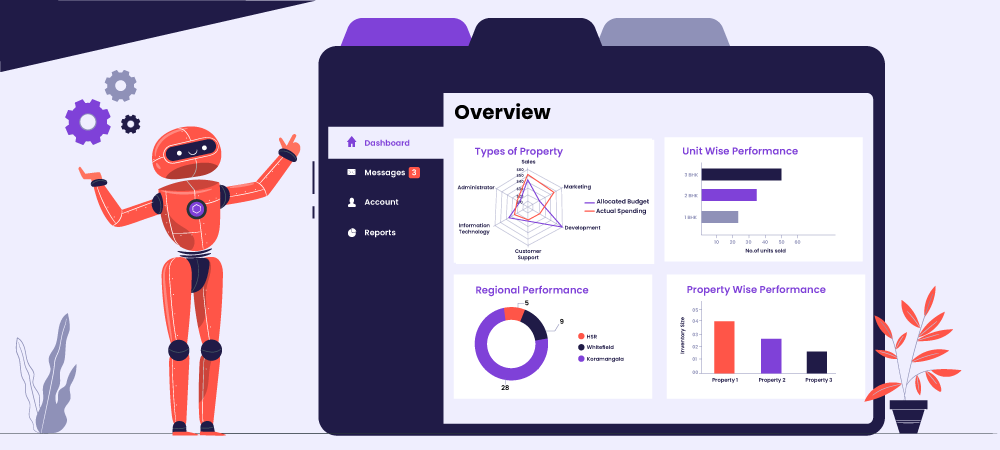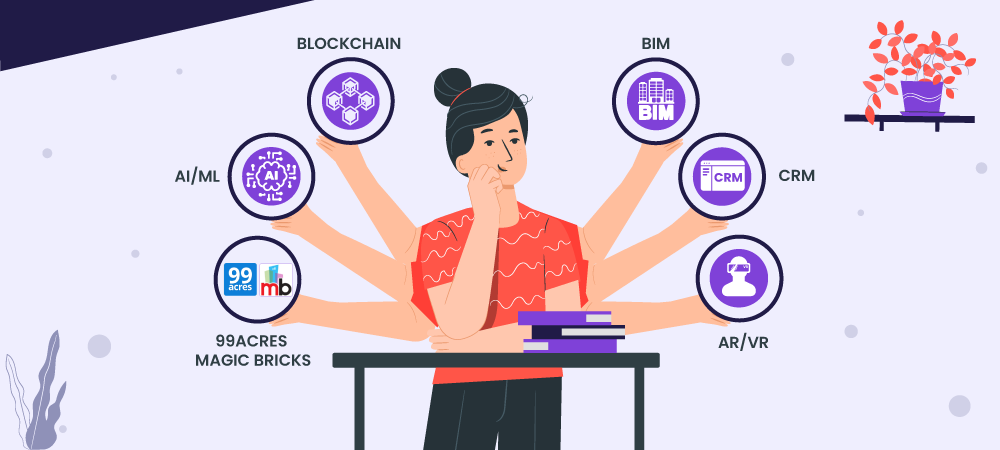People from the real estate space like to keep things traditional. But experts say, this attitude was a barrier to the real estate sales transformation during the pandemic.
While 2020 caused a serious obstruction in the real estate sales pipeline, it also served as a big bang towards digitization. When we say digitization, we are talking about property technology or PropTech. PropTech has been in the real estate space for some time. But due to the market’s shift in attitude towards digital, its adoption among real estate developers has skyrocketed.
“There was some hesitation around the adoption of PropTech because customers encouraged interpersonal interactions above anything. They preferred meeting and talking to us. But now that has changed and is still undergoing further change. There has been a shift in customer behavior as the new generation of customers prefers online media for interaction. So, when the customer profile shifts in favor of such tech, the adoption becomes very easy.”
Anil Kumar Gopalan, CEO at Malabar Developers, Kochi
PropTech can improve real estate sales and operations to a great extent. In this article, we look at a few such techs that are changing the real estate landscape.

So, What is PropTech?
PropTech or property technology is an application of Information Technology in the real estate industry that enables firms to increase convenience and efficiency in their end-to-end property management operations.
The PropTech envelops many operations such as:
- Sales
- Marketing
- Employee Management
- Secured Payments
- Customer Experience
There have been many waves of PropTech that have made shore in the last few decades. But, it is only in the last decade that we have seen significant use of these information technology tools.
Also read:
PropTech and Their Footprint in the Indian Real Estate Landscape
Here are the tools that are revolutionizing the property business.
1. Customer Relationship Management Tool

CRMs have been in mainstream use since the start of the 21st Century, with their use becoming mainstream over time. But there are still several sellers who are yet to adopt this tech.
However, more sellers may adopt CRMs in 2021 as digitization seeps into the process further. An end-to-end sales execution platform can be a game-changer in streamlining your lead funnel. A robust CRM coupled with the right Marketing Automation tool can help you increase your productivity through:
- Automated lead capture through social media, third party sites, organic, landing pages, digital ads, and traditional (offline) channels to reduce lead leakage
- Automated lead distribution based on different combinations of distribution logic.
- Call center and chat integrations
- Inventory Management
- Feet-on-street Tracking
- Email tracking and capturing website visits
Mr. Gopalan adds,
“Technology in real estate is a must. You cannot do business without it today. If you want to do an organized business in different locations, with several offices and projects, you need these tools. Not only sales-oriented tech but also design and management tools.”
LeadSquared Real Estate CRM can help increase your property sales. For example, Rohan Builders increased the efficiency of their sales process by 54%. You can read more about it here.
2. Property Portals
If there is one word to describe the value property portals have brought to the real estate market, it is visibility.
Property portals have existed in the industry for quite some time now. But their value amongst the consumers has recently jumped. Portals are breaking the wall of just in-person interaction to make real estate sales possible online.
Digital marketplace portals have also gained a lot of attention from various stakeholders in the industry. Buyers and renters were flocking in huge numbers towards platforms such as 99Acres, Magic Bricks, Housing.com, and more. Buyers could now shortlist properties based on their relevant needs. These portals also offered more content about the do’s and don’ts of real estate buying/renting. Customers could also interact with other buyers on discussion forums. It was a big win for both property sellers and buyers. The coming days will see the importance of property portals grow in the real estate space.
3. Productivity Tools for On-site Agents
Site visits are and will continue to be an intrinsic part of the home buyer journey. Developers are now helping their on-site agents interact with the customers via such applications. This PropTech allows agents to capture customer data, access inventory information, and increase sales.

Tools like LeadSquared Mobile App can enable communication with customers over Zoom for online visits. Agents can access relevant data to improve the onboarding experience of the customers. The best part about this application is that it can also track agent productivity over custom timelines.
4. Augmented and Virtual Reality
Site visits are the key to conversions in real estate. Many people thought that AR/VR would finally get its ultimate breakthrough in the RE industry.
While reality may not have been so grand, there were many strides made with virtual reality. Many sellers are giving the options of digital walkthroughs and recorded sessions of their properties to customers. Although physical visits are regaining their volume as the market opens, the digital experience is here to stay.
5. Building Information Modelling System
BIM or Building Information Modelling is another PropTech that is now becoming a go-to tool for building 3D models in the design phase. Not only does BIM clarify the project details to the property stakeholders, but it also helps a developer plan the various elements involved during the construction phase.
With this tool, developers can:
- Manage construction timelines
- Reduce redundant costs
- Mitigate any design-related problems
- Create attractive models of the property infrastructure for buyer assessment.
While BIM needs some initial capital and skill, it cuts various costs incurred during the construction and management phase.
6. Artificial Intelligence and Machine Learning

AI and ML aren’t buzzwords anymore in the real estate space. There are a vast number of applications for these concepts. For example, rental agency Multiliving Technologies Pvt Ltd uses AI to analyze your property searches. They use this data to suggest the most favorable locations for your property.
AI and ML have also found their place in chat communication or chatbots. They can interact with buyers and answer any relevant queries to create engagement and push the lead down your sales funnel. Data analytics and buyer persona are two more avenues where real estate is putting AI to use. Developers analyze customer behavior and other aspects of the market, which may encourage higher sales.
There are various other places where AI/ML has found their use like:
- Investor analytics
- Forecasting loan defaults
- Property management
- Demand planning
7. Drones
Drones are gaining the attention of realtors. They already have many use-cases in healthcare, e-commerce, transportation, education, and more. So, it seems they have a role to play in real estate as well.
Architects and developers are using drones for:
- Land surveys
- Detailed imaging of buildings under construction
- Creating videos for marketing purposes.
Live drone views are employed in project launches, to show developments in the construction process, and to give an aerial view of nearby facilities (Source: ET). In the coming days, this Proptech will have more roles in the real estate space.
8. Blockchain
Blockchain as a concept is gaining momentum across the world. The real estate sector is also realizing the potential benefits of blockchain technology. It can pave the way to hassle-free transactions that can remove intermediaries and affiliated costs, like brokerage fees, lender charges, closing costs, and more.
Additionally, it can also improve the transaction speed, solving one of the major pain points of the real estate industry. It will improve the customer onboarding experience and also make the developer’s lives easier.
Conclusion

We are at an industrial tipping point when it comes to real estate. PropTech can serve the buyers of tomorrow. And because of the changing customer preferences, digital evolution is a must to stay relevant in the market.
Find out how the LeadSquared Real Estate CRM can aid your digital transformation. Sign up now!
FAQs
PropTech or property technology is an application of Information Technology in the real estate industry that enables firms to increase convenience and efficiency in their end-to-end property management operations.
The new-age customer in the real estate space prefers convenience and accessibility. Hence the synergy between real estate operations and technology is key to addressing these changing customer preferences.
Some examples of PropTech are Real Estate CRM, Marketing Automation, ERP, AI/ML, blockchain, and more.









![[Webinar] Real Estate Evolution in India: A Glimpse into the Future](https://www.leadsquared.com/wp-content/uploads/2024/04/Automation-webinar-popup.gif)